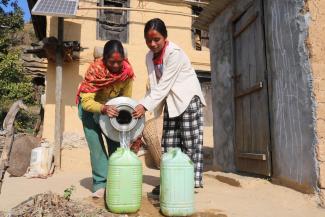In the hilly village of Pokharikanda, Surkhet, 14-year-old Sangita faced a significant problem– water scarcity. Along with 59 other families, she woke up early and trekked one kilometer to fetch water from a well. But other families in her community trekked 2-3 kilometers along a similar route.
The worst part? Sometimes, in the dry season, there was no water. "We couldn't study or finish homework because we spent a lot of time getting water,” said Sangita, who loves to sing Karnali folk songs and dreams of becoming a teacher.
On average, Sangita spent two hours each morning fetching water. In addition to the walk, she had to wait a long time for her turn to fill the water pot and depended on others to help her, as the well is deep. Recently, her village witnessed something amazing. The community can now use water at home for gardening and drinking, thanks to a new water system, installed with the support of the USAID Karnali Water Activity.
"I hope we can pass on this water system to the next generation and improve our lives,” said Gopal Buda, chairperson of the water users and sanitation committee. "In the past, many people doubted the possibility of a water scheme. Convincing people to participate in the work was very difficult, but we eventually made it a success, collectively," said Buda, reflecting on the challenges. "Youth participation and unity are our strengths,” he said.
The people in the village aren't just getting water for themselves; they are growing vegetables and thinking about selling them. "We're talking to the government and other private suppliers to sell our seasonal vegetables like cucumbers, tomatoes, potatoes, lemons, and spinach," Sanat BC, a local farmer, said.
Buda is practical when thinking about the future of water in his village. “Old wells and ponds also must be taken care of, just in case there's a problem,” he said. He wants to be ready for tough times and help the community people get continuous services.
“They've established scheme insurance, an operation and maintenance fund, and trained local maintenance workers. These steps are vital for the continued success and sustainability of these water supply initiatives built across the communities,” said Sunil Kumar Das, chief of party for the USAID Karnali Water Activity, about the future of the water system.
Water service is having a big impact on the community.
"Having access to enough water, I can now take a regular bath," said Sangita. “Even during menstruation, we faced a lot of difficulty maintaining proper hygiene due to the lack of adequate water. However, we are now fully relieved of all these challenges,” she said. Now, each morning, she diligently completes household chores, preparing meals, and ensuring her younger sister is ready for school.
Completed in just seven months, the Pokharikanda drinking water scheme incorporates advanced technology, including a double-stage solar-lifting system, to bring water to the community. All of this happened because of the USAID Karnali Water Activity.
The Activity team worked with local government authorities to leverage funds and developed policies such as a water users master plan for broader coverage. The community contributed leadership and in-kind contributions by digging the canal and other works during construction and transport of the construction materials.
By December 2023, the USAID Karnali Water Activity helped 64 communities across the Karnali river basin, reaching more than 12,000 people, ensuring sustainable improved drinking water facilities at their doorsteps.
Sangita's village is now a story of hope and success, showing that with water, dreams can come true. "Since the successful completion of the water scheme in our community, all the residents, particularly senior citizens, women, and children, are very happy. I am the happiest one because I no longer need to worry about water and can use this time for studying, playing and other activities," said Sangita with a smile.

© Pralhad Gairapipli/ USAID Karnali Water Activity

